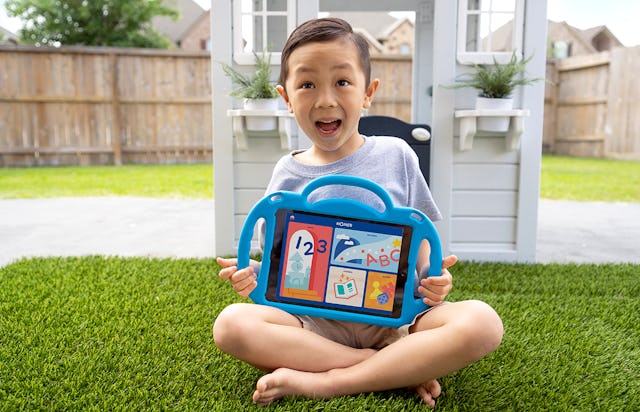This Program Increases Kids' Reading Scores By Tapping Into Their Love of Screen Time
We only recommend products we love and that we think you will, too. We may receive a portion of sales from products purchased from this article, which was written by our Branded team.

In the history of parenting, there’s no struggle more annoying than the one between parents and their kids’ screen time. Whether you’re raising a take-charge toddler, bubbly big kid, or any combo of the above, they all have screen monsters lurking inside, ready to unleash their fury at a moment’s notice. But what if there was a way for parents to befriend that inner monster, taming and even training it to work with us, perhaps even to help increase early reading scores in our kids?
Hear me out here. If your kids are like mine, they just can’t be told learning is fun and buy into it — they’ve gotta experience it for themselves. That’s where those inner screen monsters come into play: If you can introduce an app that’s as fun and entertaining as it is educational, it’ll more than likely keep kids comin’ back for more, making the most of the screen time they so cherish. I know what you’re thinking: “Great theory! Will it work?” I’m so glad you asked, because I put it to the test with my own little screen-loving kids.
First, you’ll need to start with an early learning app with enough content to keep kids engaged, and HOMER checks all the right boxes. It’s designed with kids ages 2 to 8 years old in mind, and boasts over 1,000 learning games and activities that are personalized to your child’s age and interests. Not only that, but HOMER is even proven to increase early reading scores by 74% with just 15 minutes of screen time per day. How’s that for flipping the screen time script?
Armed with my pre-K son’s tablet and my new HOMER subscription, I loaded the HOMER Learn & Grow app onto the screen and left it unattended in the living room to put it to the test. All this buzz around increasing early reading scores and getting my kids interested in subjects like math and science is fantastic, but won’t do us a lick of good if it can’t keep my kids’ attention.
From my stealthy stakeout spot in the kitchen, I saw my youngest son saunter over to the tablet, glimpse at his own name on the screen, then sit down and start clicking around. A few minutes of eerie quiet later, I heard him giggling. Then he called me in to show me something from a game he was happily playing, causing my heart to burst over his interest and enthusiasm, because every parent knows that kind of stuff just can’t be manufactured.
Courtesy of HOMER
I have some good guesses as to why he got so into this app that he forgot all about watching videos of kids opening plastic eggs filled with toys. (What’s that even about, anyway?) When he noticed the app on his tablet was literally calling his name, there was an instant curiosity as to why.
He had no idea that with my free HOMER trial, I set up a personalized profile for each of my kids according to their age, learning style, existing knowledge, and interests. He was insta-hooked because it was literally built for him, hence the DIY winter-sports themed stories, interactive color-mixing modules, outer-space-inspired memory games, and learning math by making pizzas — all things he loves IRL.
But I’m not new to this rodeo, and needed to see if his immediate attraction would fade before buying in. Thank the parenting gods that HOMER gave me 30 days to test the waters, because we’ve discovered it’s not just a passing phase, but a full-on hit in our household that could help increase early reading scores in my kiddos. Fun and engaging screen time that also builds skills for school and life, while encouraging independent play? Here, HOMER, you can have my money. You deserve it.
This article was originally published on